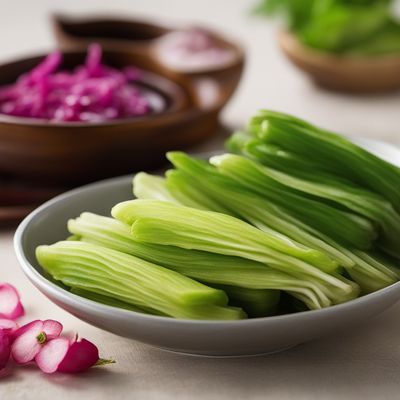
Ingredient
River lamprey
Ancient Delicacy: Exploring the River Lamprey
River lamprey is a jawless fish species found in freshwater rivers and coastal areas. It has a cylindrical body with a sucker-like mouth and a slimy, scaleless skin. The flesh of river lamprey is soft and delicate, with a rich, oily texture. It is often described as having a unique, earthy flavor with hints of sweetness and a subtle mineral undertone.
Origins and history
River lamprey has been consumed for centuries in Europe, particularly in countries like France, Spain, and Portugal. It holds cultural significance and is often associated with traditional festivals and celebrations. River lamprey dishes are considered delicacies and are highly valued for their unique taste and historical importance.
Nutritional information
River lamprey is a good source of protein, omega-3 fatty acids, and essential minerals such as iron and calcium. It is also low in saturated fat and carbohydrates. However, due to its high oil content, it is recommended to consume river lamprey in moderation as part of a balanced diet.
Allergens
Individuals with fish allergies should avoid consuming river lamprey, as it belongs to the fish family and may trigger allergic reactions. It is important to exercise caution and consult with a healthcare professional if you have any concerns or known allergies.
How to select
When selecting river lamprey, look for fresh specimens that have clear, bright eyes, and a firm texture. Avoid fish with a strong, unpleasant odor or signs of discoloration. If purchasing from a fish market or seafood vendor, ensure that they follow proper handling and storage practices to maintain the quality and freshness of the fish.
Storage recommendations
To maintain the freshness and quality of river lamprey, it is best to consume it on the day of purchase. If storing for a short period, keep it refrigerated at or below 40°F (4°C). It is advisable to clean and gut the fish before storing to prevent spoilage. Freezing river lamprey is also an option, but it may affect the texture and flavor of the fish.
How to produce
River lamprey is a wild-caught fish species and cannot be easily produced or cultivated. It is recommended to rely on reputable suppliers or local fishermen who specialize in catching and handling river lamprey.
Preparation tips
River lamprey can be prepared in various ways, including grilling, baking, or poaching. It is often marinated or seasoned with herbs and spices to enhance its natural flavors. Traditional recipes may involve cooking river lamprey in red wine or using it as an ingredient in stews or soups. It pairs well with ingredients like garlic, lemon, and butter. It is important to follow specific recipes and cooking instructions to ensure optimal results.
Culinary uses
River lamprey is commonly used in traditional European cuisines, particularly in dishes like Lamprey à la Bordelaise (lamprey cooked in red wine), Lamprey Pie, or Lamprey Soup. It is also considered a delicacy in certain regions and is often served during special occasions or festivals.
Availability
River lamprey is commonly available in European countries, particularly in regions with access to freshwater rivers and coastal areas. It can be found in local fish markets, specialty seafood stores, or restaurants that specialize in regional cuisine.
More ingredients from this category
Recipes using River lamprey

Arroz de Lampreia with a Twist
Savory Delight: A Modern Twist on Arroz de Lampreia

Homemade Pork Shumai
Savory Dumplings: Homemade Pork Shumai Recipe

Lamprey à la Bordelaise
Savory Delight: Bordeaux-style Lamprey

Chinese Chicken Salad with Sesame Ginger Dressing
Asian Fusion Chicken Salad: A Delightful Blend of Flavors and Textures

Nabemono: Japanese Hot Pot Delight
Umami Infusion: A Flavorful Journey into Japanese Hot Pot Cuisine

Homemade Spicy Cabbage Kimchi
Fiery Fermented Delight: Homemade Spicy Cabbage Kimchi

Chinese Pickles Recipe
Tangy and Crunchy Chinese Pickles: A Burst of Flavor

Shabu-Shabu with Sesame Dipping Sauce
Savor the Delights of Shabu-Shabu: A Japanese Hot Pot Extravaganza

Vegetarian Banchan: A Flavorful Twist on Korean Cuisine
Savor the Vegetarian Delights of Korean Banchan

Chirinabe - Japanese Hot Pot
Umami Delight: Chirinabe - A Flavorful Japanese Hot Pot Experience

Sammarinese-style Lamprey with Red Wine Sauce
Savor the Richness: Sammarinese-style Lamprey in Red Wine Sauce